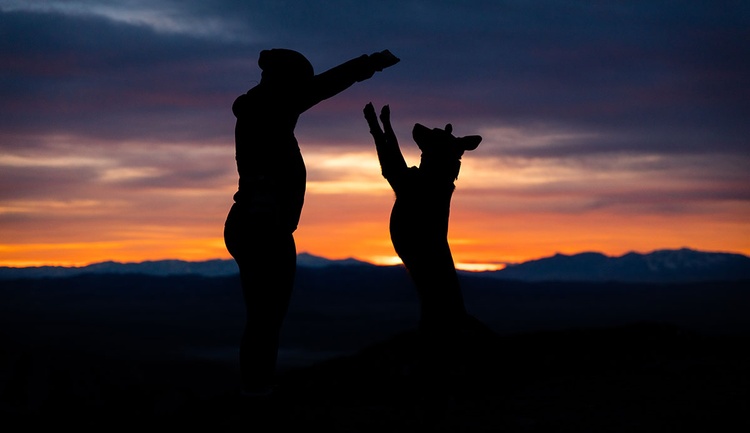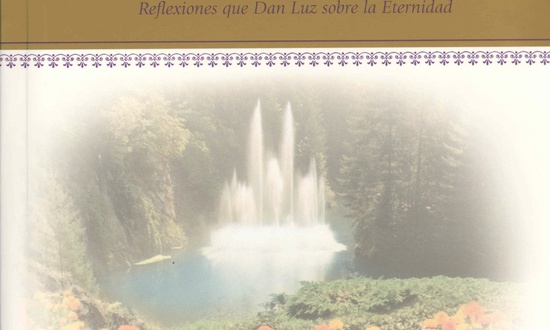La creación misma ha de ser liberada de la corrupción que la esclaviza, para así alcanzar la gloriosa libertad de los hijos de Dios. Sabemos que toda la creación todavía gime a una, como si tuviera dolores de parto. Y no sólo ella, sino también nosotros mismos . . . gemimos interiormente, mientras aguardamos . . . la redención de nuestro cuerpo. —Romanos 8:21-23
Algo mejor queda después de la muerte para estas criaturas. . . . [Ellas] un día serán liberadas de esta esclavitud de la corrupción, y entonces recibirán amplia compensación por todos sus sufrimientos presentes. —John Wesley
El cómico Will Rogers dijo: “Si no hay perros en el cielo, entonces cuando muera quiero ir adonde fueron ellos.” Esta declaración, por supuesto, se basó en los sentimientos y no en la teología, pero refleja algo bíblico: un afecto por los animales que ha sido dado por Dios.
A menudo le he dado gracias a Dios por mi perro cobrador dorado, el cual, cuando yo era niño, se metía en mi saco de dormir mientras yo yacía en el patio trasero de mi casa contemplando las estrellas. Aunque en aquel entonces yo no conocía a Dios, él tocó mi vida a través de ese perro. Nanci y yo hemos experimentado muchas horas de risa y gozo con animales. Cuando nuestros hijos y nietos se han deleitado en los animales, se han deleitado en Dios, su Creador.
Cristo proclama desde su trono en la Nueva Tierra: “¡Yo hago nuevas todas las cosas!” (Apocalipsis 21:5). No es sólo la gente la que será renovada, sino la Tierra y todo lo que hay en ella. ¿Incluye a los animales “todas las cosas”? Por supuesto. Caballos, gatos, perros, ciervos, delfines y ardillas —así como la creación inanimada—se beneficiarán de la muerte y resurrección de Cristo. El énfasis de Cristo no es en hacer cosas nuevas, sino en hacer nuevas las cosas viejas. No es sobre inventar lo que no es familiar, sino restaurar y mejorar lo que es familiar. Jesús parece estar diciendo: “Voy a tomar todo lo que hice la primera vez, incluyendo la gente, la naturaleza y los animales, y la misma Tierra, y los traeré de nuevo como nuevos, mejores e indestructibles.”
Romanos 8:21-23 es una declaración clara de que nuestra resurrección y la redención de nuestros cuerpos nos traerán liberación, no sólo a nosotros sino también al resto de la creación, la cual ha estado gimiendo en su sufrimiento. Esto presenta una pregunta obvia: ¿Quién o qué en esta creación, además de los seres humanos, gime sufriendo y está esperando la liberación? Por supuesto que la respuesta más obvia es los animales. Esto parece indicar que en la Nueva Tierra, después de la resurrección de la humanidad, algunos animales que una vez sufrieron se unirán a los hijos de Dios en gloriosa libertad de la muerte y la destrucción.
Si en la Nueva Tierra Dios creara seres humanos que nunca existieron antes—en vez de resucitar a personas que antes vivieron en la Tierra—¿cumpliría eso la promesa de Romanos 8 de redención, liberación y resurrección? No. ¿Por qué? Porque para que se cumpla el pasaje, los redimidos y resucitados en el nuevo mundo deben ser las mismas personas que sufrieron en el primer mundo. De otra forma, el anhelo de la redención no sería cumplido.
Como va la humanidad, así van los animales. Si llevamos a su conclusión lógica el paralelo que hace Pablo entre los seres humanos y los animales gimiendo, entonces por lo menos algunos de los animales que sufrieron en la primera Tierra deberán ser restaurados en la Nueva Tierra.
Recuerde que no es alguna clase abstracta de animales la que gime; son animales específicos que sufren y mueren en la primera Tierra, al igual que son personas específicas las que gimen y claman por su propia resurrección—no por la de alguien más. Esto sugiere que Dios puede resucitar, o por lo menos re-crear, a ciertos animales que vivieron en la primera Tierra.
Si en realidad Dios va a re-crear algunos animales de la primera Tierra en la nueva, parece razonable preguntar si algunas de nuestras mascotas estarían incluidas.
Una vez cuando hablé en una universidad bíblica, le pedí a la audiencia que levantaran las manos si Dios había tocado profundamente las vidas de algunos de ellos por medio de un animal particular que había tenido como mascota. Noventa por ciento de los mil o más presentes levantaron la mano.
Los animales no son tan valiosos como la gente, pero Dios es todavía su Creador y ha tocado las vidas de muchas personas a través de ellos. Sería muy simple para él re-crear una mascot en la Nueva Tierra si quisiera hacerlo. Él es el dador de todas las cosas buenas, no el que las quita. Y como Padre, es mucho mejor que nosotros para dar cosas buenas a sus hijos (Mateo 7:9-11). Por cierto que si nos hiciera más felices en el Cielo, Dios estaría dispuesto a restaurar a un animal favorito, porque cuando encontramos felicidad en la creación de Dios, encontramos felicidad en él.
Dios podría hacer una de tres cosas en la Nueva Tierra con referencia a los animales: Podría (1) crear animales completamente nuevos; (2) traer a la vida animales que han sufrido en nuestro mundo presente, dándoles cuerpos inmortales (esto podría ser por la re-creación, y no necesariamente la resurrección); o (3) crear algunos animales completamente nuevos “a partir de cero” y traer a la vida algunos de los primeros animales.
Debemos ser cuidadosos para evitar errores teológicos. Debemos reconocer y afirmar las diferencias fundamentales entre los seres humanos y los animales. Es por eso que estoy evitando el término resurrección con respecto a los animales en la Nueva Tierra. Sin embargo, en un sentido amplio, las palabras redención y resurrección pueden aplicarse en forma apropiada no sólo a la humanidad sino también a la tierra, la vegetación y los animales. Por supuesto que un campo, una pradera, una flor o un animal resucitado en ningún sentido serían iguales a los seres humanos resucitados; es simplemente que la redención y la resurrección podrían pisarles los talones a las de la humanidad, al igual que sucedió con las consecuencias de la Caída.
En su libro titulado El Gran Divorcio, Lewis presenta a Sarah Smith, una mujer común y corriente en la Tierra, como grande en el Cielo. En la Tierra ella amaba tanto a la gente como a los animales. En el Cielo ella está rodeada de los mismos animales que cuidó en la Tierra. ¿Podría en realidad suceder eso? Conociendo a nuestro Dios lleno de gracia, y a los deleites que le gusta prodigar a sus amados hijos, yo no me sorprendería.
¿Ha tenido alguna vez una mascota que Dios ha usado en su vida? ¿Le ha recordado alguna vez Dios de alguno de sus atributos a través de los animales? ¿Le quiere dar gracias a Dios por tocar su vida por medio de los animales?
Padre, gracias por el papel de los varios animales en nuestras vidas. Gracias porque tu creación te importa tanto que ninguna ave cae sin que lo notes. Gracias por hacer provisiones para los animales dentro de tu ley, incluyendo un día de descanso del trabajo. Es claro que tu corazón siente por todas tus criaturas, las grandes y las pequeñas. Señor, gracias por prometer que el resto de la creación, no sólo los seres humanos, será librada del sufrimiento en nuestra resurrección para disfrutar de tu nuevo mundo. Si es parte de tu plan traer animales de esta primera Tierra a la Nueva Tierra, incluyendo nuestras mascotas, te daremos gracias por ellas, como también te agradecemos por el consuelo, compañerismo y entretenimiento que nos diste por medio de ellas.
Animals We Love Might Live Again
The creation itself will be liberated from its bondage to decay and brought into the glorious freedom of the children of God. We know that the whole creation has been groaning as in the pains of childbirth. . . . We ourselves . . . groan inwardly as we wait eagerly for . . . the redemption of our bodies. —Romans 8:21-23
Something better remains after death for these poor creatures. . . . [They] shall one day be delivered from this bondage of corruption, and shall then receive an ample amends for all their present sufferings. —John Wesley
Humorist Will Rogers said, “If there are no dogs in heaven, then when I die I want to go where they went.” This statement was, of course, based on sentiment, not theology, but it reflects something biblical: a God-given affection for animals.
I’ve often thanked God for my golden retriever, who crawled into my sleeping bag as I lay in my backyard gazing up at the stars when I was a boy. Though I didn’t know God then, he touched my life through that dog. Nanci and I have experienced many hours of laughter and joy with animals. When our children and grandchildren have delighted in animals, they have delighted in God, their Creator.
Christ proclaims from his throne on the New Earth: “Behold, I am making all things new” (Revelation 21:5, nasb). It’s not just people who will be renewed, but the earth and everything in it. Do “all things” include animals? Of course. Horses, cats, dogs, deer, dolphins, and squirrels—as well as the inanimate creation—will be beneficiaries of Christ’s death and resurrection. Christ’s emphasis isn’t on making new things, but on making old things new. It’s not about inventing the unfamiliar, but restoring and enhancing the familiar. Jesus seems to be saying, “I’ll take all I made the first time, including people and nature and animals and the earth itself, and bring them back as new, fresh, and indestructible.”
Romans 8:21-23 is a clear statement that our resurrection, the redemption of our bodies, will bring deliverance not only to us but also to the rest of creation, which has been groaning in its suffering. This raises an obvious question: Who or what in this creation, besides human beings, is groaning in suffering and is waiting for deliverance? Surely the most obvious answer is animals. This seems to indicate that on the New Earth, after mankind’s resurrection, some animals who once suffered will join God’s children in glorious freedom from death and decay.
If God created on the New Earth human beings who had never before existed—rather than resurrecting people who had lived on the old Earth—would it fulfill the promise in Romans 8 of redemption, deliverance, and resurrection? No. Why? For the passage to be fulfilled, those redeemed and resurrected into the new world must be the same people who suffered in the old world. Otherwise, their longing for redemption would go unmet.
As mankind goes, so go the animals. If we take to its logical conclusion the parallel that Paul makes between humans and animals groaning, then at least some of those animals who suffered on the old Earth must be made whole on the New Earth.
Remember, it’s not some abstract “animalkind” that cries out; it’s specific animals living and suffering and dying on the old Earth, just as it’s specific, suffering people who groan and cry out for their own resurrection—not for someone else’s. This suggests that God may resurrect, or at least re-create, certain animals that lived on the old Earth.
If God indeed will re-create some animals from the old Earth on the new, it seems reasonable to ask whether our beloved pets might be included.
While speaking at a Bible college, I asked the audience to raise their hands if God had deeply touched their lives through particular animals they’d had as pets. Ninety percent of the thousand or more people raised their hands.
Animals aren’t nearly as valuable as people, but God is still their Maker and has affected many people’s lives through them. It would be simple for him to re-create a pet on the New Earth if he wanted to. He’s the giver of all good gifts, not a taker. And, as a parent, he is far better at giving good gifts to his children than we are (Matthew 7:9-11). Certainly, if it would make us happier in Heaven, God would be willing to restore a favorite animal to us, for by finding happiness in God’s creation, we find our happiness in him.
God could do one of three things regarding animals on the New Earth. He could (1) create entirely new animals; (2) bring animals back to life that have suffered in our present world, giving them immortal bodies (this could be through re-creation, not necessarily through resurrection); or (3) create some brand-new animals “from scratch” and bring some old ones back to life.
We must be careful to avoid theological error. We should recognize and affirm the fundamental differences between humans and animals. That’s why I avoid using the term resurrection with respect to animals on the New Earth. However, in a broad sense, both redemption and resurrection can appropriately apply not only to mankind but also to the earth, vegetation, and animals. Of course, a resurrected field, meadow, flower, or animal would in no sense be equal to a resurrected human; it’s simply that redemption and resurrection can ride the coattails of mankind, just as the consequences of the Fall did.
In The Great Divorce, C. S. Lewis portrays Sarah Smith as an ordinary woman on Earth who became a great woman in Heaven. On Earth, she loved both people and animals. In Heaven, she’s surrounded by the very animals she cared for on Earth. Could that actually happen? Knowing our gracious God and the delights he lavishes upon his beloved children and even his beloved animals, I would not be surprised.
Have you ever had a pet that God used in your life? Has God reminded you of any of his attributes through animals? Do you want to thank God for touching your life through animals?
Father, thank you for the roles that various animals have played in our lives, from childhood on. Thank you that you are so aware of your creation that no bird falls to the ground without your notice. Thank you for building provisions for animals into your law, including a day of rest from labor. Clearly your heart is touched by all your creatures, great and small. Lord, thanks for promising that the rest of creation, not just humans, will be delivered from suffering at our resurrection to enjoy your new world. If it happens to be part of your plan to bring animals from this old Earth to the New Earth, including our pets, we will thank you for them, even as we thank you now for the comfort and companionship and entertainment you have provided us through them.
Excerpt from 50 Days of Heaven by Randy Alcorn, Day 31
Photo by Patrick Hendry on Unsplash



